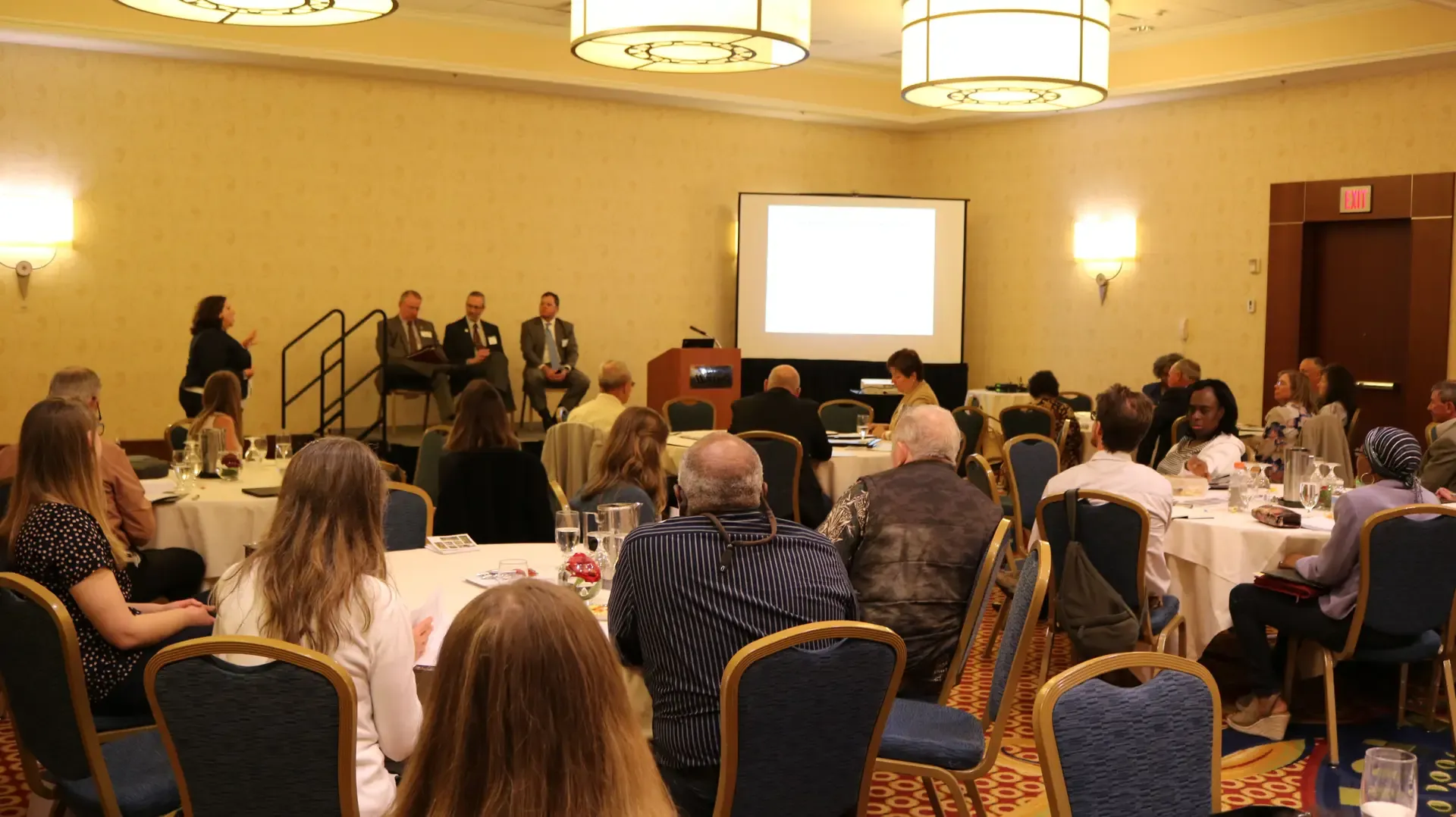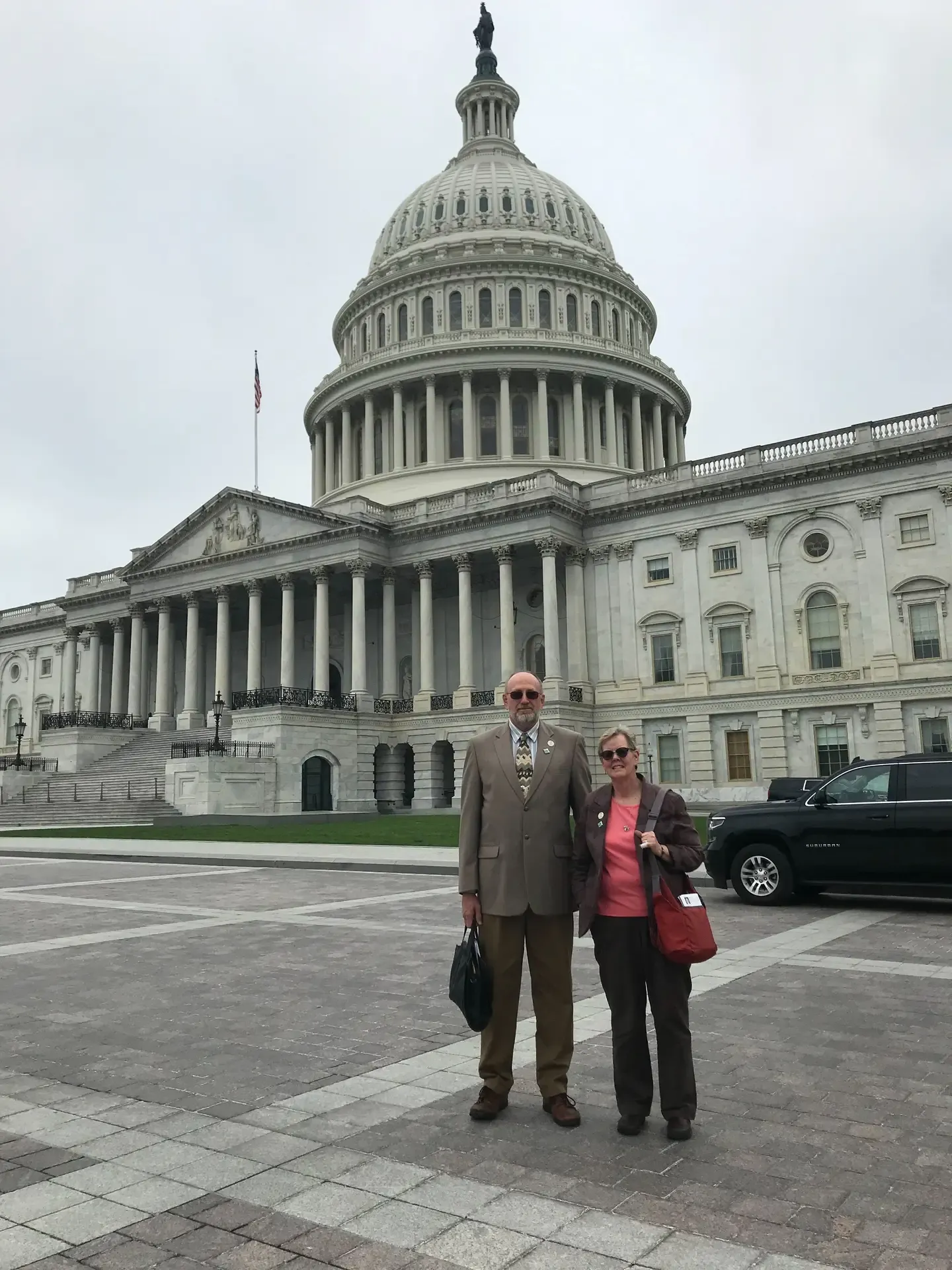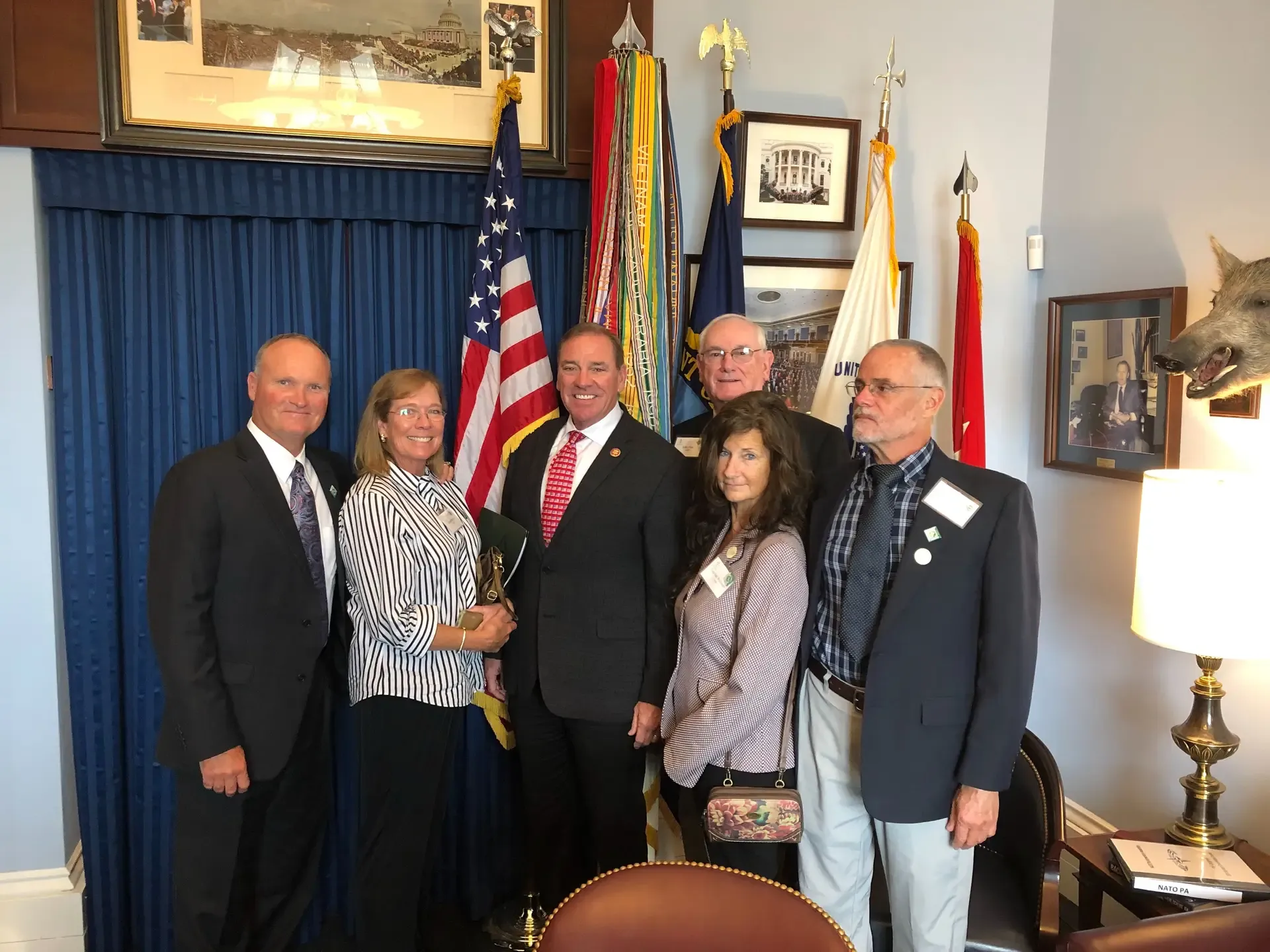Advocating for Healthy Forests
On April 30, 48 Tree Farmers from 20 states across the country traveled to Washington, D.C. to advocate for forestry issues on behalf of family forest owners around the nation. Before heading towards Capitol Hill, participants received an in-depth briefing from staff on federal policy issues that impact family forests and were taught strategies for being an effective advocate. On May 1, attendees met face-to-face with members of Congress and their offices.

AFF's Rita Hite presenting on advocacy strategies to Fly-In attendees.
Hill Days allow family forest owners to tell their stories and underscore their important role in providing for all Americans. Whether attendees are seasoned advocates or newcomers to Capitol Hill, visits with their members helps to keep these representatives updated on issues that are important to their constituents and allows for advocates to build strong relationships with legislators.
Working to Protect and Increase Markets for Family Forest Owners
Bill and Tina Buckel, the 2019 Maryland Tree Farmers of the Year, attended the Fly-In for the first time. They were determined to overcome the nerves and leave a lasting impression on their representatives.
The day before the couple was set to head to D.C., they learnt that the Luke Mill in Allegany county, the pulp mill in their neighboring county, was being shut down. Because of the lack of mills in the Northeast, the shutdown of this mill will not only have an enormous effect on the timber industry in Maryland, but in Pennsylvania and West Virginia as well. Learn more about the closing of Luke Mill.
With this news, Tina and William arrived in D.C. more determined than ever to talk with their representatives and get them to understand the importance of investing in timber markets. With four scheduled meetings throughout the day, the Buckels were sure they would be able to develop a relationship with someone that was willing to listen. In their third meeting, the Buckels met with Meghan Conklin, Agriculture Legislative Assistant in Senator Chris Van Hollen’s office. In her previous position as a professional staff on the House Committee on Natural Resources, Meghan had been able to work with family forest owners out West. Through this work she learned about the barriers that many family forest owners face everyday and because of this was able to understand just how severe this situation will be for the Buckels and the many other family forest owners that rely on the business of this mill.

Bill and Tina Buckel, Maryland landowners, standing in front of the U.S. Capitol building during the 2019 Fly-In.
The Buckels are excited to continue communicating with Senator Van Hollen’s office and Meghan Conklin in hopes of finding a solution to the barriers that family forest owners face.
Disaster Strikes
After 27 years of serving in the Air Force, Jim Browne and his wife Allison were ready to find a place where they could enjoy the outdoors, conserve the land, and share their love of nature. They settled down near Clarksville, Florida on 400 acres of woodland.
After having worked with a forester to put together a forest management plan for their new land, the Brownes were ready to start working to restore the land to provide habitat for the local wildlife as well as to use for income to sustain themselves during retirement.
In 2018, after having heavily invested in restoring the land and the necessary equipment to maintain it, Hurricane Michael started to head toward shore. The eye of the storm went directly over Clarkesville and the Brownes’ Tree Farm.
Of their woodland, 200 acres was completely destroyed. Their consulting forester estimated that due to the storm the Brownes had lost $225,000 worth of timber. Making it worse, the soil remained too wet for months afterward, preventing a logger from taking the timber while it was still of value. At an average of $2,000 to $4,000 per acre to remove the debris, the Brownes were unable to afford the cleanup.

Tree Farmers from Florida meeting with Representative Neal Dunn during the 2019 Fly-In.
This year at the Fly-In, the Brownes not only were going to be sharing their story, but also the story of the other 17,000 landowners that were affected by Hurricane Michael. After meeting with their Representatives, the Brownes and several other advocates from Florida, continue to be optimistic that help will come. Learn more about the Brownes and their story.
Advocating for Critical Forestry Program Funding
With the recent implementation of the 2018 Farm Bill, natural disasters such as wildfire and hurricanes that have devastated forests, and other issues that impact woodland owners, Fly-In participants had plenty to discuss with their representatives.
Specifically, participants asked their representatives to:
Pass a disaster aid package – Last year alone, more than 17,000 family forest owners were affected, and 5 million acres were damaged or destroyed by Hurricane Florence and Michael. With an estimated $2 billion in timber loss, these landowners are still struggling to find the resources they need to restore their woodlands to health. By helping family forest owners to recover after these natural disasters, we can help them restore these lands to healthy forests, support local economies, and make sure that these forests can continue supporting essential species and providing clean water to local communities.
Pass the Forest Recovery Act – House bill H.R. 1444 was reintroduced by Representative Buddy Carter (GA-01) and will soon be introduced in the Senate by Senator Hyde-Smith. Many Fly-In attendees brought this tax bill up in their meetings in hopes that their representatives would understand the importance of this legislation and would cosponsor it. The bill specifically allows forest owners who grow timber for the purposes of sale to deduct from their taxes the full value of the timber at the time of the loss. Under current law, the landowner is only allowed to deduct the adjusted basis value of the timber, which is oftentimes only a fraction of the stands current value. This discounts the time and work the landowner has invested, in many instances over decades, to bring the healthy stand to market.
Support markets for wood products by asking Members to support $25 million in funding for the Community Wood Energy/innovation Program and $7.8 million for Wood Innovation Grants – In order to increase markets for wood products, we must increase the demand. By growing these markets, it continues to help family forest owners to afford the good stewardship needed to protect habitat, improve water quality, replant trees and more. It is essential to develop new and expand existing markets for wood in order to continue supporting private landowners.
Increase funding for the Landscape Scale Restoration Program to $20 million – To successfully protect America’s forests, we must work across multiple ownership to tackle landscape-wide issues such as wildfire, at-risk wildlife, species decline such as white oak, and sources of sustainably grown wood to mills. Through the newly improved LSR program, we will be able to see measurable results like clean drinking water and species conservation.
Provide $30 million towards Farming Opportunities Training and Outreach Program – One program that would specifically benefit from this funding is the Sustainable Forestry and African American Land Retention (SFLR) program. With the increase in available resources, SFLR would be able to continue their work to increase the profitability and value of African-American owned forests and promote forest retention in this population.
AFF would like to thank all those who participated in the week’s events. Strong policies for family woodland owners and forest conservation would not be possible without the voices of Tree Farmers and forest owners on Capitol Hill. To keep up to date with ongoing forest policy issues, subscribe to our Policy and Advocacy email newsletter.
Related Articles

October 23, 2025
Forestry Organizations Urge Trump Administration to Support Private Landowners in Trade Practices
The American Forest Foundation (AFF), Forest Landowners Association (FLA), and National Alliance of Forest Owners (NAFO) sent a joint letter today to Secretary of Agriculture Brooke Rollins and Secretary of the Treasury Scott Bessent urging the Trump administration to include private forest landowners, family forestry businesses, and timber product manufacturers in efforts to address unfair trade practices.

October 21, 2025
Statement: Critical Wildfire Legislation Moves to Senate Floor
“AFF applauds the U.S. Senate Committee on Agriculture, Nutrition, and Forestry for advancing the Fix our Forests Act.

October 8, 2025
Statement: AFF Applauds Confirmation of USDA Officials
AFF congratulates Under Secretaries Boren, Fordyce, and Hoskins on their confirmation to leadership roles at USDA. These agencies provide critical support to private landowners through technical assistance, financial assistance, grants, and other programming to keep their working forests healthy and productive.